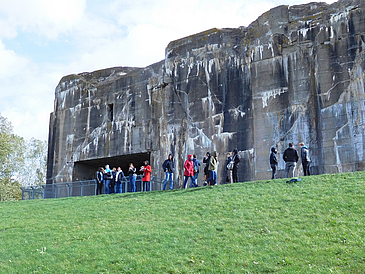“The aim of the project was to raise awareness of the injustice that the Soviet prisoners of war suffered in the Second World War”, according to the Bremen project leader Dr. Ulrike Huhn from the History Department at the University of Bremen.
Search for Traces on Site
In the frame of the project, the students analyzed material places of remembrance, such as monuments or cemeteries, but also rituals of remembrance, for example local discourse on the remembrance culture. A special focus was placed on the questions of why female prisoners of war play a comparably small role in the public awareness. The Bremen students dealt with this question for their own region and cooperated with the place of remembrance “Bunker Valentin” and the Sandbostel memorial. In 3 one-week encounters in September 2018 in Bremen, in February 2019 in Dnipro (Ukraike) and in May 2019 in Rostow (Russia), the students talked about their results. They visited local places of remembrance, such as the mass shooting location in Smijowskaja Balka near to Rostow and the former POW camp 348 on the premises of a psychiatric clinic near to Dnipro. The upcoming meeting in Bremen will form the final part of the project.
Collaborative Knowledge Store as a Contemporary Way of Accessing Remembrance
The interactive platform “Terra Oblita” (“Forgotten Land”) was developed during the project with the help of a professional graphic designer from Moscow. The results of the research project are now presented in the form of texts, sources, photos, audio and video material on said platform. Each citizen is invited to contribute. In order to simplify this, guidelines that make a plea for contributions and provide methods for dealing with local remembrance culture have been developed. “The active participation in the platform is a low threshold, historical learning form, which is well suited for learning within and outside of schools”, according to Ulrike Huhn.
Meeting under Special Conditions
When taking the political frictions between Russia and the Ukraine since the annexation of Crimea and the continuing war in the East Ukraine into consideration, the collaborative work of the three student groups poses a special challenge. The Ukrainian and Russian students can only meet in Bremen. At the beginning of the project week in Bremen, a discussion workshop regarding the situation in the East Ukraine took place. A mediator who works in the conflict regions of Caucasus and East Europe led the workshop. It was clear to everyone that this is an explosive topic that could not be entirely ignored. The students saw the intense exchange and the collaborative work as being very fruitful.
The head leader of the “Memory-Wiki – Auf den Spuren der Erinnerung an ‚vergessene‘ NS-Opfer in der Ukraine, Russland und Deutschland“ (Memory wiki – Looking for traces of remembrance of ‚forgotten‘ NS victims in the Ukraine, Russia and Germany) project is the Berlin association KONTAKTE-KOHTAKTbI e.V. For many years, the association has made efforts for the remembrance of the suffering of Soviet prisoners of war and gained two collaboration partners with the Universities of Dnipro (Ukraine) and Rostow am Dom (Russia). The project is partially funded by the Federal Foreign Office, who especially supports meetings of such a type. They do this to keep channels of communication open, especially in light of the current war situation.
Public Talk and Remembrance Ceremony
On Tuesday, August 20, 2019, at 7 p.m., Dr. Rolf Keller from the Stiftung Niedersächsische Gedenkstätten (Foundation of Memorial Sites in Lower Saxony) will hold a talk with the title “Sowjetische Kriegsgefangene in deutscher Hand. Eine vergessene Opfergruppe?“ (Soviet prisoners of war at the hands of the Germans. A forgotten victim group?) Afterwards, the participants will present their project and the “Terra Oblita” internet platform. The event will be in both German and Russian: there will be a simultaneous translation. The event will be held at the Haus der Wissenschaft, Sandstr. 4/5, 28195 Bremen. Entry is free of charge.
On Wednesday, August 21, 2019, at 12:30 p.m., the students will hold a remembrance event as a public intervention at the Präsident-Kennedy-Platz (in front of the Bremen State Archive). The event is intended to remind the public of one of the Bremen camps for Soviet prisoners of war, the former riding stable in Fedelhören 1.
Further information:
The “Terra Oblita” platform is online from August 20, 2019:
www.geschichte.uni-bremen.de/?page_id=2880 (in German only)
https://kontakte-kontakty.de/jugend-und-bildungsprojekte/(in German only)
www.hausderwissenschaft.de/Universitaet-Bremen-59.html (in German only)
Contact:
Dr. Ulrike Huhn
History Department
University of Bremen
Phone: +49 421 218 67361
Email: ulrike.huhnprotect me ?!uni-bremenprotect me ?!.de

